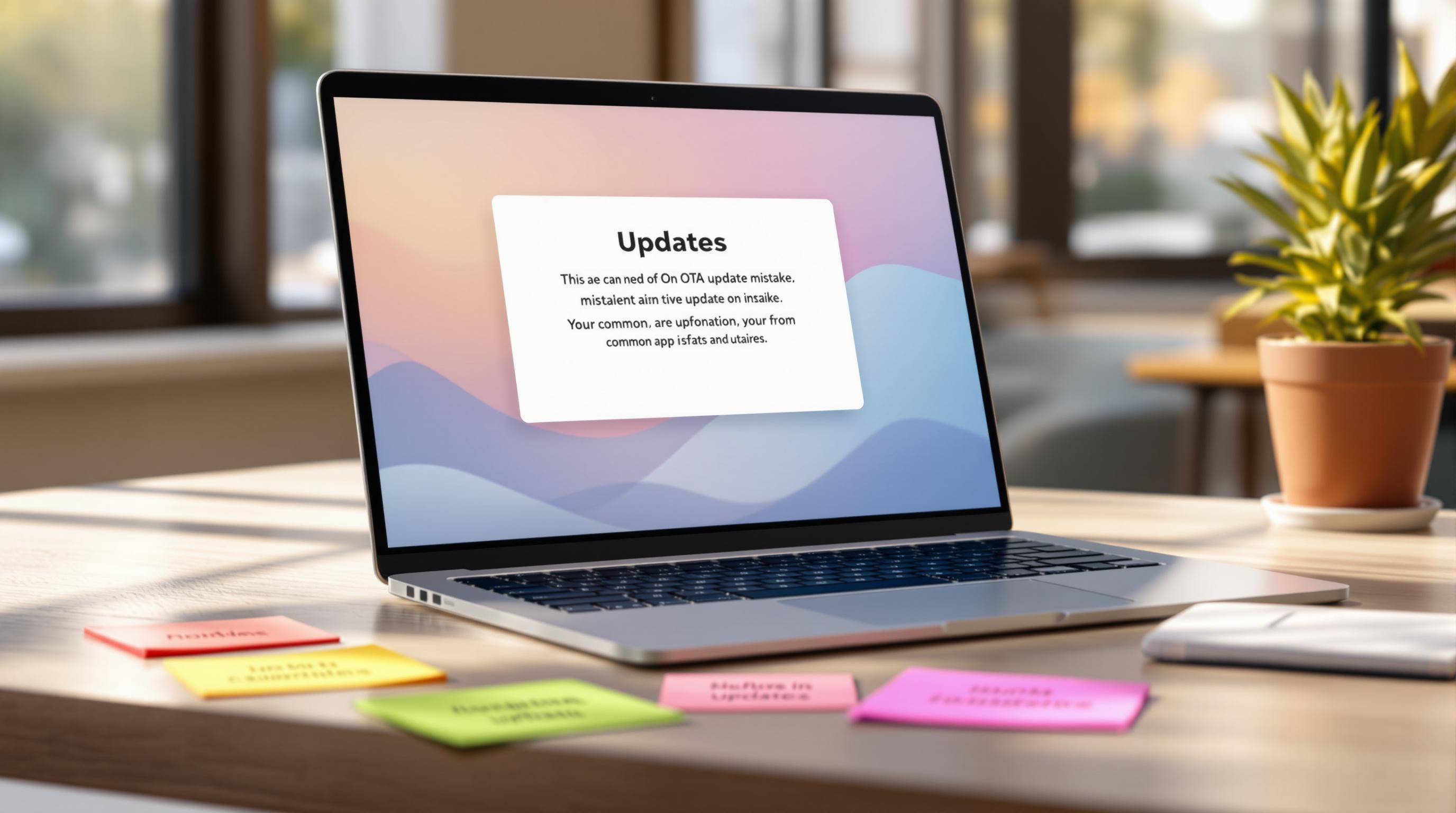Capgo enables developers to deliver instant, secure app updates without waiting for app store reviews. With end-to-end encryption, seamless CI/CD integration, and compliance with app store rules, it’s a cost-effective alternative to traditional updates or pricier platforms like AppFlow. Over 947.6 million updates have been deployed across 1,400 production apps, improving development efficiency by 81%.
Key Benefits of Capgo:

- Instant Updates: Fix bugs or roll out features without delays.
- Secure Deployments: Updates are encrypted and accessible only to authorized users.
- Cost-Effective: OTA updates start at just $12/month. Optional CI/CD setup service for building native apps available for $2,600 one-time.
- Controlled Rollouts: Target specific users or groups for updates.
- App Store Compliance: Fully adheres to Apple and Google policies.
Quick Comparison of OTA Platforms:
| Platform | Key Features | Limitations | Cost |
|---|---|---|---|
| Capgo | Secure OTA, CI/CD ready, user targeting | Initial setup effort | From $12/month; optional CI/CD setup $2,600 |
| AppFlow | Ionic integration, enterprise support | High cost barrier | $6,000/year |
| App Center | Free tier, Microsoft-backed | No hybrid app support | Free tier available |
Capgo is ideal for developers needing fast, compliant updates without breaking the bank. It’s praised for its ease of use, affordability, and reliability in production environments.
Can You Perform OTA Updates for iOS Apps? Apple Guidelines Explained
1. Capgo Features
Capgo’s platform offers powerful over-the-air (OTA) update capabilities, ensuring secure and efficient app updates. With end-to-end encryption, updates are accessible only to authorized users, keeping deployments secure from start to finish.
Capgo works effortlessly with popular CI/CD platforms like GitHub Actions, GitLab CI, Azure DevOps, Jenkins, and CircleCI. OTA updates start at just $12/month. For teams needing automated CI/CD pipelines to build native mobile apps, an optional setup service is available for $2,600 one-time, which is far more affordable than AppFlow’s $6,000 annual fee. This integration simplifies deployment while adhering to app store regulations.
The platform’s user assignment system gives developers precise control over update distribution. This feature allows for targeted rollouts and beta testing while staying within app store policies. As colenso shared:
“We rolled out Capgo OTA updates in production for our user base of +5000. We’re seeing very smooth operation almost all our users are upto date within minutes of the OTA being deployed to @Capgo.”
Here’s a quick overview of Capgo’s standout features:
| Feature Category | Capabilities | Benefits |
|---|---|---|
| Security | End-to-end encryption | Keeps updates accessible only to authorized users |
| Integration | Azure DevOps, GitLab, GitHub, Jenkins | Simplifies the deployment process |
| Distribution | User assignment system | Enables controlled rollouts and testing |
| Management | Multiple organization support | Provides detailed permission control |
Capgo also supports multi-organization management, letting teams create and manage separate organizations with tailored user permissions. This adds another layer of control to your update workflows.
2. Standard App Store Updates
Updating apps through traditional app stores comes with its own set of challenges. The required review process often delays the time between identifying a problem and releasing a fix. This forces developers to group several changes into a single update, making testing and deployment more complicated. These delays make it harder to quickly address issues and improve apps continuously, creating a need for faster solutions that still meet app store rules.
Development teams today are looking for ways to speed up updates while staying compliant with app store guidelines. Tools like Capgo provide an option, allowing developers to release updates multiple times a week - improving efficiency by as much as 81% [1]. This shows how traditional update processes can hold back agile development, increasing the demand for tools that support quick releases without breaking the rules.
These changes in how updates are managed are part of a larger trend in the industry. Teams aim to create faster, more responsive workflows while still meeting the quality and security standards set by app stores.
sbb-itb-f9944d2
3. Alternative OTA Platforms
Standard app store updates can be slow, making alternative OTA platforms an appealing option for faster, compliant updates. Several platforms are stepping up to meet this demand.
Microsoft’s App Center recently stopped supporting live updates for hybrid apps, leaving developers searching for new solutions. Simon Flack shared his perspective on this shift:
“We are currently giving a try to @Capgo since Appcenter stopped live updates support on hybrid apps and @AppFlow is way too expensive.”
Ionic’s AppFlow remains an option, but many developers criticize its high cost and limited functionality. At $6,000 per year - compared to Capgo’s OTA updates starting at just $12/month - it’s a tough sell for some. LeVar Berry expressed his frustrations:
“Cancelled my @Appflow subscription after 4 years. Code-Push never seemed to work well, hopefully @CapGO has it figured out.”
To better understand the landscape, here’s a quick comparison of key OTA platforms:
| Platform | Key Features | Limitations | Cost Structure |
|---|---|---|---|
| AppFlow | Built-in Ionic integration | Functionality concerns | $6,000/year |
| App Center | Backed by Microsoft | No hybrid app support | Free tier available |
| Capgo | End-to-end encryption; CI/CD ready | Still maturing as a platform | From $12/month for OTA |
The industry is clearly looking for more affordable and reliable OTA solutions. Even NASA’s OSIRIS-REx team weighed in:
“@Capgo is a smart way to make hot code pushes (and not for all the money in the world like with @AppFlow) 🙂.”
These changes underscore the growing need to balance fast deployment with app store rules, without breaking the bank.
Benefits and Limitations
Take a closer look at OTA update methods, drawing insights from real-world examples and developer feedback.
| Update Method | Key Benefits | Notable Limitations | Cost Impact |
|---|---|---|---|
| Traditional App Store | • Built-in user trust • Guaranteed compliance • No extra infrastructure needed | • Long approval times • Limited update frequency • Higher development effort | Base app store fees |
| Capgo OTA | • Instant updates • End-to-end encryption • CI/CD integration • Control over user assignments | • Initial setup effort • Platform-specific limitations | From $12/month; optional CI/CD setup $2,600 |
| AppFlow | • Seamless Ionic integration • Enterprise-grade support • Comprehensive tools | • High upfront cost barrier | $6,000/year |
This table highlights the balance between fast OTA updates and conventional app store methods. Capgo stands out by offering instant deployments and strong security measures, addressing common delays and risks tied to app store updates.
Capgo’s use of end-to-end encryption ensures updates are accessible only to authorized users, making it a more secure option than traditional methods. Its proven performance - delivering 947.6 million updates across 1,400 production apps - shows its reliability for large-scale projects [1].
Even NASA’s OSIRIS-REx team praised Capgo for its cost-efficient approach:
“@Capgo is a smart way to make hot code pushes (and not for all the money in the world like with @AppFlow) 🙂”
While app store updates can take weeks for approval, Capgo enables developers to release updates multiple times a week, keeping development cycles agile. The choice between these methods depends on your project’s needs, team expertise, and available budget.
Key Findings and Recommendations
Our analysis highlights patterns for effective and compliant OTA updates, offering insights to guide your decision-making when adopting these methods.
Choosing the right update strategy depends on your project’s specific needs:
| Project Need | Recommended Approach | Evidence |
|---|---|---|
| Critical Bug Fixes | Capgo OTA Updates | ”Avoiding review for bugfix is golden.” – Bessie Cooper [1] |
| Cost-Sensitive Projects | Capgo (OTA updates from $12/month) | Saves costs compared to other alternatives [1] |
| Enterprise Scale | Traditional + OTA Hybrid | Over 947.6M successful updates across 1,400 production apps [1] |
Here are some strategies that build on these findings:
-
Hybrid Update Strategy
Combine app store updates with OTA updates for quick fixes. Rodrigo Mantica emphasized this approach:“We practice agile development and @Capgo is mission-critical in delivering continuously to our users!” [1]
-
Security-First Deployment
Capgo ensures secure updates with its end-to-end encryption, making it a reliable option for enterprise applications [1]. -
Controlled Rollouts
Gradual rollouts are possible with Capgo’s user assignment feature. Colenso’s team shared their experience:“We’re seeing very smooth operation almost all our users are up to date within minutes of the OTA being deployed to @Capgo.” [1]
For teams moving to a new platform, Capgo offers an easy integration process. Jay (@jaythegeek) noted:
“Did setup @Capgo and testing out this awesome replacement for @AppFlow! Thank you for the hard work, it has been easy so far” [1]




